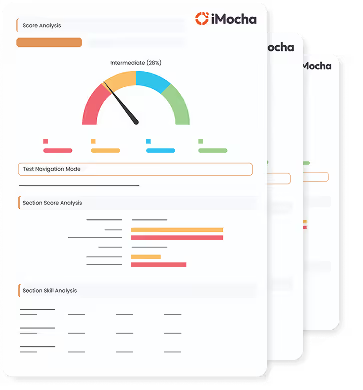


Choose easy, medium, or tricky questions from our skill libraries to assess candidates of different experience levels.
Choose easy, medium, or tricky questions from our skill libraries to assess candidates of different experience levels.

Choose easy, medium, or tricky questions from our skill libraries to assess candidates of different experience levels.

Choose easy, medium, or tricky questions from our skill libraries to assess candidates of different experience levels.
This a comprehensive PDF report, which you can instantly download and share with your hiring team or candidates for seamless collaboration.
Download Sample Report



IMocha's Android Developer test is the most preferred skills assessment to gauge a candidate’s knowledge of the Android operating system. This Android skills test enables hiring managers and recruiters to hire job-fit candidates for an Android Developer position. The online Android coding test can reduce hiring time by 45% and reduce technical screening time by 80%.





%20(1).webp)
Android developers are expected to design and build advanced applications for the Android platform. The Android developer creates a UI and writes a business logic for the app. The Android programmer also performs unit tests for the codes written and ensures that adequate security measures are taken to protect valuable data used in the app. Android developer test helps recruiters and hiring managers to evaluate the ability of candidates to develop Android applications. This Android interview test is specially designed to check the application, i.e., the practical skills of an Android developer as per industry standards. The Android aptitude test helps tech recruiters to evaluate the working skills and job readiness of a candidate. Hence, the emphasis is laid on evaluating the knowledge of applied skills gained through real work experience, rather than theoretical knowledge. The Android interview practical test can be taken by candidates from anywhere in the comfort of their time zone.

The Android practical test helps to screen the candidates for the following:
1. Strong knowledge of Android SDK, different versions of Android, and how to deal with different screen sizes.
2. Ability to perform analysis, design, and development in enterprise.
3. Familiarity with SOAP & RESTful APIs to connect Android applications to back-end.
4. Strong experience with offline storage, threading, and performance.
5. Ability to work on cloud message APIs and push notifications.
The Android coding test is designed by global Subject Matter Experts (SME) to hire Android developers. Using powerful reporting, a detailed analysis of the test results is provided, facilitating better hiring decisions and predicting the candidate's performance.
The Android interview coding test has a set of questions to cope with recent developments in technology. Moreover, you can add your own questions as per the job's requirement. Features like window violation and webcam proctoring help to detect cheating during the test. The test may contain MCQs (Multiple Choice Questions), MAQs (Multiple Answer Questions), Fill in the Blanks, Descriptive, Whiteboard Questions, Audio / Video Questions, AI-LogicBox (Pseudo-Coding Platform), Coding Simulations, True or False Questions, etc.
The Android skill test is designed considering EEOC guidelines and helps assess and hire diverse talent without any bias.
Discover in this blog post how iMocha's assessments can aid you in evaluating and recruiting Android developers.







.webp)
.webp)
.webp)
.webp)